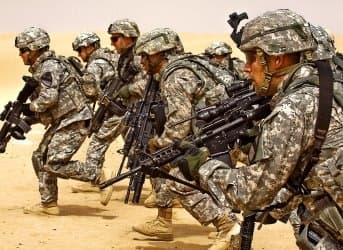NATO Secretary-General Anders Fogh Rasmussen said energy security isn't necessarily a call to arms for the alliance in a globalized world. Crude oil markets reacted strongly to crises in Egypt, Libya and Syria, though prices have retreated in recent trading because of lingering war fatigue. Rasmussen said, however, that increased global demand could lead to disputes over scarce natural resources. While the secretary-general said the fight over oil and natural gas won't involve military hardware, maneuvers in the Middle East and North Africa may paint a less definitive picture.
Rasmussen addressed the need for military forces to become more energy efficient in order to save money and reduce vulnerabilities. Targeted NATO supply lines in Afghanistan, for example, have encouraged some members of the alliance to rely less on fossil fuels. The International Energy Agency, however, says oil will remain the largest source of energy at least through 2035. Some markets, like the United States, are retreating from the international stage because of higher domestic production. Demand centers are shifting, however, adding credibility to the notion that energy security is an international issue.
The International Energy Agency said increased oil and gas production from countries like Brazil, Iraq and the United States, coupled with rising demand from emerging economies, is shifting the poles in terms of energy markets. The Paris-based agency said this "changing energy map" may have broader implications on geopolitics. Subsequently, competition over natural resources means just as much to military planners now as it did in the 1970s when OPEC held Western economies hostage.
Related article: Energy’s Biggest Names Converge in a Tired, Old Place
U.S. President Barack Obama is scheduled to address the nation Tuesday to discuss the security crisis in Syria. Toeing the proverbial "red line" in the sand, Washington said it was mulling some form of limited military response to alleged Syrian use of chemical weapons on civilians in Damascus. That, along with production shortfalls in Libya and political turmoil in Egypt, has sparked a late season spike in crude oil prices. Syria "jitters" may have spilled over to consumer markets but at least one scenario sees high tides receding because there are no real physical oil supplies at risk in Syria.
In late 2010, some U.S. lawmakers expressed concern the decision to release Lockerbie bomber Abdelbaset al-Megrahi from custody the previous year was tied to a BP deal to drill for oil in Libya. The following year, British forces joined their NATO counterparts in fighting off forces loyal to Moammar Gadhafi in Libya's civil war. Now, it seems the British decision to shy away from military confrontation may have just as much to do with lucrative contracts in the region as it does with war fatigue at home.
Rasmussen last week inaugurated a NATO energy security center in Vilnius, the Lithuanian capital. Members of the EU met there last week to consider a coordinated defense policy as well. The secretary general said energy has several security-related aspects ranging from terrorism to piracy. Rasmussen said most energy matters, however, will be settled by the markets, not by the guns. Energy security, he said, is not a call to arms. But in an interconnected world, things are rarely as clear cut as that.
By. Daniel J. Graeber of Oilprice.com


















